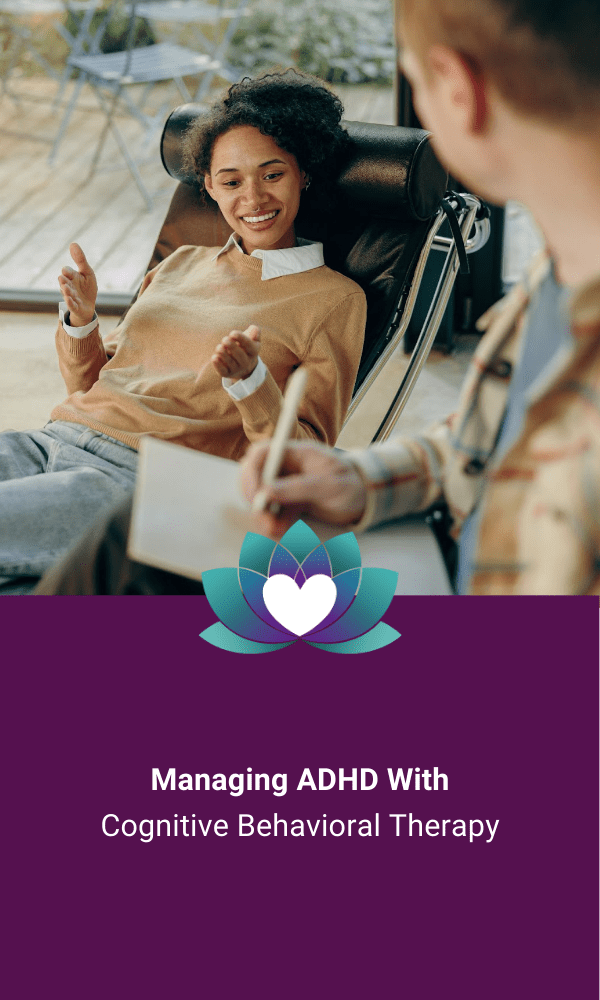Understanding ADHD and CBT
Cognitive behavioral therapy in Vancouver can be a useful modality for ADHD. Attention Hyper-Deficit Disorder is extremely common among children and adults alike, and over the last few years, we’re learning even more about managing it. ADHD is nothing to be ashamed of. However, you might be struggling with the symptoms that come with ADHD, and that’s where Cognitive Behavioral Therapy in Vancouver (CBT) can help.
But first, let’s learn what ADHD and CBT are, respectively.
What is ADHD?
ADHD is a neurodevelopmental disorder characterized by persistent patterns of inattention, hyperactivity, struggle focusing, or impulsivity. While ADHD can manifest similarly in both men and women, there are some gender-specific differences in how it may present. Men with ADHD are more likely to exhibit hyperactive symptoms, such as restlessness and fidgeting, while women may be more prone to inattentive symptoms, like difficulty staying focused and organizing tasks (The ADHD Centre, 2022). Additionally, women with ADHD are often more likely to internalize their symptoms, leading to other mental health struggles, such as anxiety (ADDitude Mag, 2021). Of course, not one rule applies to all and these can vary.
These symptoms can interfere with daily life, leading to challenges in school, work, and relationships. It is important to note that ADHD is not a laziness or lack of motivation; rather, it is a brain-based condition that affects how information is processed and organized.
What is Cognitive Behavioral Therapy in Vancouver?
Cognitive Behavioural Therapy (CBT) is an evidence-based form of therapy that addresses the relationship between thoughts, feelings, and behaviors. When thoughts and beliefs are challenged, often the feelings and the behaviors will change as a result. Behavioral habits require an intentional interruption of the behavior, and a reframe of the thoughts associated. “Cognitive behavioral therapy (CBT) is one of the most common and best studied forms of psychotherapy. It is a combination of two therapeutic approaches, known as cognitive therapy and behavioral therapy.” (NIH, 2022).
CBT has become essentially an umbrella-term, encompassing many other modalities of therapy. It is also often used in cooperation with these other therapies.
What is the connection between ADHD and CBT?
Though you may not immediately associate the two, it’s important to note that the challenges presented by ADHD are a focus of CBT. As Crystal Raypole explains: “For many people living with ADHD, medication can help ease symptoms and improve quality of life. But medication can’t help you learn new skills that promote long-term change. That’s where therapy can make the most difference.” (Raypole, 2021). This also outlines how other methods of treatment, such as medication, can be important and effective.
Cognitive-Behavioral Therapy focuses on identifying and changing negative thought patterns and behaviours that contribute to difficulties. By understanding how thoughts, feelings, and behaviours are interconnected, individuals with ADHD can learn to recognize and challenge unhelpful thoughts, develop coping strategies, and improve their focus and attention. CBT can also help in developing time management skills, organisation techniques, and problem-solving abilities, which are often challenges for those with ADHD.
However, CBT is a great option either in conjunction, or as an alternative so that you can at least have the option of dealing with the symptoms of ADHD your own way. At ClearHeart, we’re more than capable of helping you start that journey.
Can CBT help me if I don’t have ADHD?
The way it can help you navigate a neurotypical world not designed for ADHD is one aspect of CBT’s strengths, but if you don’t have ADHD, this therapy may still be helpful. This is because CBT can also be used as a treatment option for many different concerns. It is widely regarded as useful as treatment for symptoms of depression, anxiety, addiction disease, eating disorders, and severe mental illness. (APA, 2017).
It is for these reasons, among others, that CBT could be a fantastic option if you are looking for something new as you continue to improve your overall well-being.
How can I try Cognitive Behavioral Therapy in Vancouver?
Ultimately, taking the first steps to try cognitive behavioural therapy can be difficult, but at ClearHeart, we want to make that process as simple and as rewarding as possible. Click here to learn more about how CBT in Vancouver works at ClearHeart, and book in with one of our amazing team members.
References:
American Psychological Association. (2017). Cognitive behavioral therapy for PTSD. https://www.apa.org/ptsd-guideline/patients-and-families/cognitive-behavioral
National Center for PTSD. (2022). Cognitive-behavioral therapy for PTSD. In PTSD: National Center for PTSD (pp. 1-15). https://www.ncbi.nlm.nih.gov/books/NBK279297/
Raypole, Crystal. (2021). Cognitive behavioral therapy for ADHD: What you need to know. https://www.healthline.com/health/adhd/cbt-for-adhd
ADHD in Women. (2021). ADDitude Mag. https://www.additudemag.com/category/adhd-add/adhd-in-adults/add-women/
Female vs. Male ADHD. (2022). The ADHD Centre. https://www.adhdcentre.co.uk/female-vs-male-adhd/

